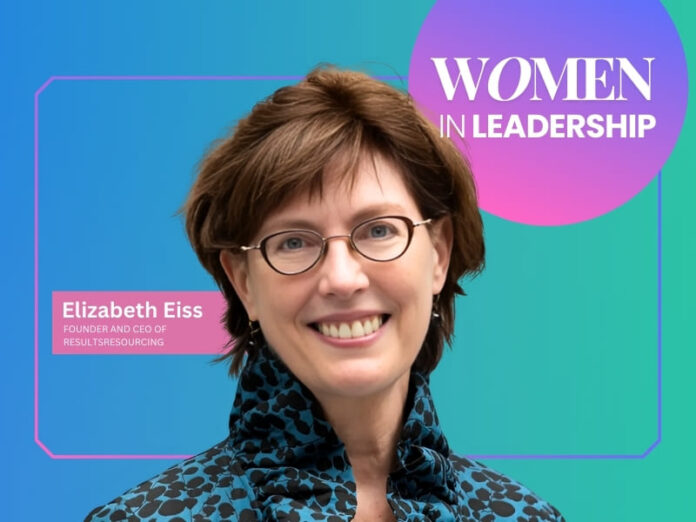There are a host of recruitment platforms geared towards large enterprises. But what of the smaller business or one-person outfit looking to take on contract talent? Elizabeth Eiss of ResultsResourcing has the answer.
It’s great to meet you, Ms. Eiss! Can you tell us a little about how your leadership journey began?
Thank you so much for including me in your leadership series, I’m delighted to share my journey. After years of leadership roles running large businesses in the insurance industry, I changed gears and joined my first start-up about two decades ago. I’d always felt that leadership was about positive influence and not power or authority, and joining the world of entrepreneurship was the place to ultimately apply those principles in a completely dynamic environment, where success was significantly impacted by solutions that met client needs and an engaging customer experience. All of this required leadership on multiple levels.
The inspiration for leadership in my current field evolved from consulting work I was doing about 15 years ago, after that first start-up failed. I would hire skilled, contract freelancers to augment my consulting project teams. I was good at finding excellent freelance talent and my clients noticed and began to ask me to find and vet freelancers for them. In the course of doing this work informally and working through the myriad of DIY job platforms, I found the proverbial gap: no human help for small businesses hiring contractors. I was sure I could design and build a talent platform that would handle the mechanics of recruiting but would insert access to skilled human recruiters who would help the client hire contractors successfully. And I did.
In 2015, I incorporated and began to build the business model and the technology platform. In January 2017, we launched ResultsResourcing, the freelance staffing platform that comes with your own recruiter. You get the heart and hands of real human beings in finding, interviewing, and vetting freelance choices, plus everything great about online job board platforms. We do the work for you. For a small fee, we match your skill needs with virtual independent professionals, saving you time, hassle, and opportunity cost, and lowering your contract hiring risk. Satisfaction guaranteed.
What inspired you to focus on “solopreneurs” and small to mid-sized businesses as your primary clients?
The mission to help small employers scale and succeed! The sheer numbers of businesses to serve is massive, plus the recognition that interesting innovation frankly begins in small organizations.
In the US, 99.9 per cent of all businesses are solopreneurs (non-employee firms) or small employers with fewer than 10 or so employees. This is probably true around the world as well. This group is highly fragmented and are forced to “DIY” in growing their businesses. Our goal is to help these businesses be more successful and scale their impact.
The mission to help small employers scale and succeed! The sheer numbers of businesses to serve is massive, plus the recognition that interesting innovation frankly begins in small organizations.
I experienced first hand the challenge of finding skilled, quality freelance talent using the well-known job platforms of today. I knew there was a better way that combined technology and human beings, resulting in a better experience and better results for both employers and freelancer workers.
The #1 hiring challenge for small businesses is finding quality, reliable talent. We are virtual talent matchmakers and enable businesses to scale quickly with skilled contractors. So, imagine you’re a speaker, consultant, merchant, manufacturer, or creative agency; you can hire a freelance virtual assistant, copy writer, customer service rep, and more, to get work done well. ResultsResourcing helps you outsource, so you can focus on what you do best!
Can you walk us through the initial steps you took to develop and launch ResultsResourcing?
I was inspired to create ResultsResourcing after hiring freelancers using the major online platforms myself. I noticed many job platforms were not designed for smaller companies, yet were used successfully by enterprise companies with skilled HR teams. While there is abundant talent online, the process is extremely laborious for small businesses and many don’t have hiring expertise. The result: inconsistent hiring decisions and the opportunity cost of time spent on DIY recruiting / hiring.
I was confident I could enable solopreneurs and small employers to hire quality freelancers cost-effectively. I designed and co-developed our proprietary platform and business model from the ground up with solopreneurs and small employers in mind. Leveraging technology makes it cost-effective but the special sauce is that we integrate human hearts and hands to curate talent, and humans actively support small-business employers and freelancers.
Our business has grown dramatically year over year – growth in clients served, freelancers engaged, and revenue generated as a result of our quality matching process. How did we do that? How are we doing that still? Three key ideas prevailed during all the ups and (hard) downs of building a business:
- Scalable business framework: our business model and technology enable us to scale up.
- Client-driven innovation: we constantly listen to our clients (and the freelancers who serve them) and evolve our offerings to meet what our target clients need to be successful.
- Outsourcing work to trusted independent contractors: we ”drink our own champagne,” as the saying goes. We outsource work to appropriately skilled, performance-oriented, independent pros (and their teams) to scale operations as a hybrid workforce.
What were some of the biggest challenges you faced then and how did you overcome them?
I’ll mention two of the many challenges any entrepreneur faces:
Probably the biggest challenge was educating the very market I wanted to serve about the gig economy and the opportunity to scale through utilizing talented virtual freelancers. When I started the company, the benefits of outsourcing to virtual freelance or contract workers were well known to large enterprises. It was an unknown or even novel idea to smaller businesses who were used to employee models and working with onsite resources.
Strategy one was networking. I sought out and engaged with intentional, professional B2B networking groups relevant to my target market. I deliberately joined networking groups because I knew I’d have a chance to hone “my elevator pitch”, and that other members would want to meet with me and provide useful feedback (and even try my service)! Groups can be “power partners” and I approach networking with a sense of curiosity and ample desire to serve and connect others.
I sought B2B groups that prioritized what is often cited as “givers’ gain.” I helped others. That fit me (vs “selling”), so I approached each organization from the mindset of how can I contribute to the group and to others, be it referring business, participating in the organization, providing new solutions to persistent problems. It’s often not a one-to-one payback but, over time, my giving resulted in gains of prospect referrals, speaking opportunities, and an ongoing forum to test out ideas as I iterated my business, beside the direct fulfillment that comes from giving. I developed educational materials, wrote articles, gave presentations, and did podcasts, which helped me evolve my ideas and laid the foundation for an active marketing and social media strategy.
The second was staffing. I knew I could not build a successful, scalable company that I envisioned by myself. So, I essentially built the company by practicing what I preached – building and scaling my own company with virtual freelance talent. I was a solopreneur myself. My challenge to myself was to take ResultsResourcing as far as I could using vetted, virtual contractors. Standing in my customers’ shoes every single day meant I built process and technology solutions to solve real-world problems that aligned with my outsourced business model.
How has ResultsResourcing evolved since its inception, and what have been some key milestones in its growth?
The business has constantly evolved following a cycle of vision, strategy, execution, reflection, and adjustment. Each phase has built on the prior one, while remaining focused on the steady objective of empowering the purpose of solopreneurs and small employers. Evolving is a strength (not a failure) as you adapt to realities and the dynamics of the market and life. Key milestones include:
- Idea/vision (2014): ResultsResourcing, the freelance job platform that comes with your own recruiter. We do it for you.
- Inception, ideation, building the business model and technology with various “manual” pilots along the way (2015-16)
- First model – matching the client’s business needs of any kind with custom talent pools of individual virtual freelancers, with one freelancer awarded the work (2017-19)
- COVID (2019-21) – a positive for us, as our target market was forced to become adept at remote work, or not survive. We could help
- Second and current model – niche focus on the concept of virtual assistance as a professional service. Since every business has a backroom, our solutions increasingly focused on how to outsource that back-office, non-core work, so the business owner could focus the majority of time on the core work that delivers value to the market. The “on demand” VA teams we provide can fulfill a broad set of skills and tasks within one team. The teams are competent, reliable, nice, and available right now (stood up in 24-48 hours). This model is attractive and affordable and in demand generally for ongoing work, but we can also do projects. The teams are in the US and Canada, so they are also knowledgeable about cultural and business operations.
What are your short-term and long-term goals for the company?
We are currently focused on scaling our services and offering thought leadership to solopreneurs and small employers on how to leverage the freelance economy.
Over time, it may make sense for ResultsResourcing to become a part of a larger organization focused on talent curation and operational scaling, as I believe hybrid talent models will dominate in the future for both small and large organizations. Contract talent is one element of the talent spectrum, and perfectly suited when needs are non-full-time or for specialty skills.
How do you see the gig economy and freelance talent landscape evolving in the next five to 10 years, and how is your company preparing for these changes?
Many publications speak to workplace trends which point to a strong future for the “gig economy.” As one point of reference on LinkedIn recently, “According to a report from the Mastercard Center for Inclusive Growth, the global gig economy generated approximately $204 billion in gross volume in 2018, with expectations of continued growth. Moreover, data from the U.S. Bureau of Labor Statistics indicates that 55 million Americans participated in gig work in 2017, accounting for about 34 per cent of the U.S. workforce, a figure projected to rise to 43 per cent by 2023.”
We have been committed since day one to empowering the purpose of solopreneurs and small employer through effective, efficient utilization of skilled freelance workers. We build and deploy win-win solutions for both the buyers (business owners who hire) and sellers (contractors who provide services) in today’s fluid talent market.
As a female CEO, what unique perspectives or challenges have you encountered in your leadership journey?
Like many, I worked hard, won advancement opportunities, and performed as a doer and leader in the corporate world. Then I reached a professional pivot point; what was next wasn’t another version of the challenges I’d met or responsibilities I’d had. I realized I had been an “intrapreneur” in corporate. When a compelling start-up opportunity came my way, I took it, however hard it was to leave the structure and security of a large company. That first start-up ultimately did not succeed but I learned a lot and knew that entrepreneurship was the right path for me.
Embracing constraints and the fact that resources are always finite is another success factor. Constraints are everyone’s everyday reality, whether it’s limited funding, experience, networks, or changing market dynamics.
In retrospect, what enabled me to succeed and transition was being curious, open-minded, and welcoming of new ideas. I’d always been willing to take risk, balanced by thoughtful planning and gaming out the scenarios or options. I’m also big on communication and collaboration, not only by inviting alternative views but also in the implementation of new ideas through involvement of others. I’m happy to strategize but always get down to ground level and get my hands dirty, too.
Embracing constraints and the fact that resources are always finite is another success factor. Constraints are everyone’s everyday reality, whether it’s limited funding, experience, networks, or changing market dynamics.
I learned to love constraints and how they caused me to think, “How can I … ?” To think resourcefully, to look for workarounds or a different way to solve a problem, or to collaborate. Since solving often took time, I also learned to give myself time and space to create new ways to accomplish my objectives. Some of my best, really scalable ideas emerged from constraints and an open mind about “How can I … ?” and became, “Of course, why didn’t I think of that way before?”
It also taught me to pursue big ideas, but to think in small, incremental steps. Not only is this more manageable from an execution standpoint but, in the time it takes to create and launch something meaningful, the world changes in ways you can’t always anticipate (hello, pandemic) and you never have perfect information nor understanding. Be nimble, think in scale, iterate.
What strategies or practices have you found most effective in empowering and supporting other women in leadership roles?
Women helping women: sharing knowledge and experience, so other women develop the skills and tools to be successful in the rough-and-tumble world we live in.
And finally, how do you define success?
Being purpose-driven, being grounded in some larger, sustainable idea of service. This helps when times are tough, so you never quit on the ideas in which you believe. As the river guide said, “When in doubt, keep paddling.”
I have confidence in my paddling because of my purpose, even when the river takes me to places I didn’t expect. I’m open to that and how it can enhance my purpose.
Being of service is essential to me, personally, and the foundation of my company’s mission is to serve others. Our purpose is to make productive matches between businesses and freelancers. As we see their needs shift, our tactics shift, but we remain consistent in our purpose.
Executive Profile



























![“Does Everyone Hear Me OK?”: How to Lead Virtual Teams Effectively iStock-1438575049 (1) [Converted]](https://www.europeanbusinessreview.com/wp-content/uploads/2024/11/iStock-1438575049-1-Converted-100x70.jpg)




